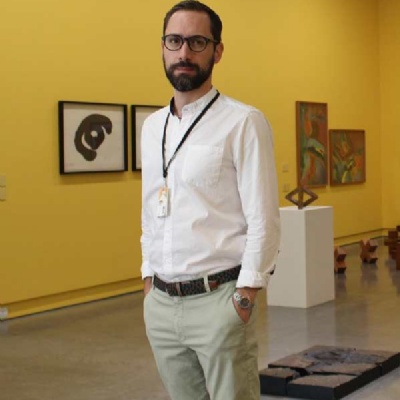Art as a Universal Language

Emiliano Valdés (UWC Adriatic 1997-1999) is a curator, editor and cultural producer based in Medellin (Colombia) and Guatemala City. He is currently Chief Curator at the Medellin Museum of Modern Art, where he has held the position since late 2014. We had a chat with him about his work in the arts and his UWC experience, and we learnt how art can be a powerful means to bring people closer to their humanity and to each other.
“I work with contemporary art but I like to think that I can make exhibitions about broader issues, or address broader issues through various forms of art and culture. I always knew that I’d work in the arts as I felt that it’s a language that goes beyond borders and speaks beyond specific groups. I feel that art can connect us with our deepest, most human essence and it is in those moments that we understand what it means to live with ourselves and others. Empathy, consciousness and responsibility arise from that experience. The world is full of problems and, whereas immediate solutions are needed for all of them, I think it’s only through a collective consciousness shift that we can truly change the world. I believe that change can –partly– come from art and culture.
What am I passionate about? People connecting, being empathetic and making an effort to help others. I am also passionate about making all of that in ways that can challenge our understanding of life, the universe, our preconceptions of the world, of others, and of ourselves. I’m obviously passionate about art and how it can transform our gaze and our mind, make us look at the world in a different way, free our mind from small, egoistic thinking. I love that art has no boundaries and no taboos, everything can be discussed, and things, themes, concerns, and urgencies approached in non-orthodox ways. In that sense, I think art is like the playground or the lab (as in a science lab) of life, a place where you can try things out before they reach other disciplines.
In this context, I find univocal perspectives challenging: the idea that only one person is right or people that put their own interest over the greater, common good. I also find politics challenging and in a way wish I could participate more actively, but I think bringing people closer to their own humanity is a way of getting the entire world closer to what can bring us together.
UWC remains, to date, one of the most influential experiences I’ve been through. Some of my best friends in the world are people that I went to UWC with. Beyond that, I think the UWC movement is the proof (improvable, surely) that we do want, and can work towards a better world. It also showed me that understanding something or someone means becoming one with them. You don’t have to understand in a rational way but you have to be willing to let go of your prejudices and take things and people for what they are. I think, in a way, that is why I work with art: to bring people closer, to give people the possibility of imagining a better, friendlier, more empathetic, more just world.
Injustice and people suffering bring tears to my eyes, and how to contribute to that from my place in the world, occasionally keep me up. Societies that struggle to change for the better, especially when it’s in their own hands drive me up the wall (take the recent result of the plebiscite in Colombia, for example). And I think the same gets me out in the morning. I love what I do and I love people that love what they do, especially when it involves changing things. We’ve come a long way but there are still so many things to change in this world, we all need to get out in the morning and contribute to that, in our own way”.
